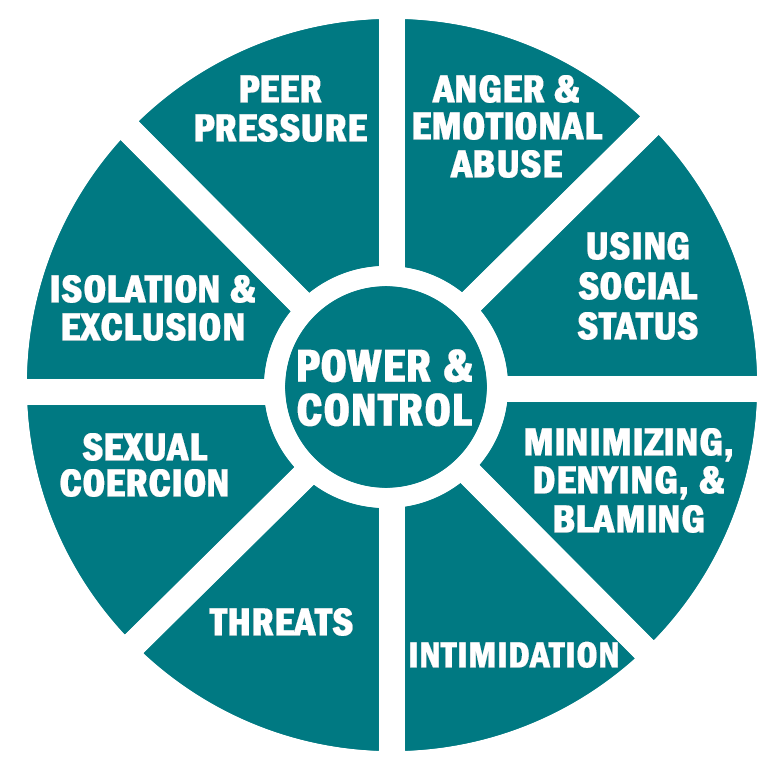How can I identify if I am in an abusive relationship?
If you’re questioning if you are in an abusive or toxic relationship you should act on it, seek advice and help from many platforms such as this one.



Different types of abuse
Many people only think there are 3 or 4 types of abuse but in reality, there are a lot more than most people realise. Abuse takes many forms and it may come in a way that isn’t obvious.
|
|
|
Click on the wheel to find out more about different types of abuse.
Different types of abuse
Many people only think there are 3 or 4 types of abuse but in reality, there are a lot more than most people realise. Abuse takes many forms and it may come in a way that isn’t obvious.
|
|
|
Click on the wheel to find out more about different types of abuse.
How to identify the 5 signs of emotional abuse
Everyone has a right to have their own comfort zone during any relationship whether big, small or no matter your age. No one should put down your feelings or control you in a healthy relationship.
We have decided to focus on emotional abuse as it is one of the most common types, and there isn’t a lot of information in simple language that would be appropriate for young people.
For information on other forms of abuse you can visit this link.
Ignoring your boundaries or privacy.
-
- Wanting the relationship to move faster than you are comfortable with emotionally or physically.
- Checking your messages, emails, social media without your consent.
Manipulation
-
- Withdrawing affection when you have done something “wrong”
- Ignoring or excluding you
- Guilt trip
- Doubting yourself
- Denying something you know is true or trying to force you to think differently
Dismiss you and your feelings
-
- Playing down your emotions by saying your too sensitive or crazy
- Making fun of your achievements, hopes or dreams
- Refusing to take responsibility for their actions
- Blaming you or someone else for their actions
- Disregarding your feelings
They are hyper critical/judgemental towards you.
-
- Putting you down in front of others
- Embarrassing/humiliating you
- Using sarcasm or jokes to make you feel badly towards yourself
- Being opinionated on what you do, say or think.
- Upset when you think differently (e.g. what you’re interested in, what you spend money on and who you spend time with etc.
Being possessive and or controlling
-
- Monitoring your actions
- Constantly trying to get your attention when your not around (e.g. excessive calls or texts)
- Getting upset when you want to spend time with someone other than them.
- Isolating you from other people/ activities/ work
- Demanding access to your messages, emails, social media account
BBC The Social have made Control, a film depicting a fictional account of an abusive relationship, which we’ve embedded in this article:
When Zara leaves home to go to university in Aberdeen she meets Ed. Her friends in Glasgow start noticing her drop off the grid and are worried about Ed’s increasingly controlling behaviour. This is a story about how an abusive relationship can develop over time, even when it looks perfect to all your followers on Instagram.
*WARNING: Control is a fictional account of unfolding emotional and physical abuse in a relationship and some viewers may find scenes triggering or upsetting.
How to identify the 5 signs of emotional abuse
Everyone has a right to have their own comfort zone during any relationship whether big, small or no matter your age. No one should put down your feelings or control you in a healthy relationship.
We have decided to focus on emotional abuse as it is one of the most common types, and there isn’t a lot of information in simple language that would be appropriate for young people.
For information on other forms of abuse you can visit this link.
They are hyper critical/judgemental towards you.
-
- Putting you down in front of others
- Embarrassing/humiliating you
- Using sarcasm or jokes to make you feel badly towards yourself
- Being opinionated on what you do, say or think.
- Upset when you think differently (e.g. what you’re interested in, what you spend money on and who you spend time with etcetera.
Manipulation
-
- Withdrawing affection when you have done something “wrong”
- Ignoring or excluding you
- Guilt trip
- Doubting yourself
- Denying something you know is true or trying to force you to think differently
Ignoring your boundaries or privacy.
-
- Wanting the relationship to move faster than you are comfortable with emotionally or physically.
- Checking your messages, emails, social media without your consent.
Dismiss you and your feelings
-
- Playing down your emotions by saying your too sensitive or crazy
- Making fun of your achievements, hopes or dreams
- Refusing to take responsibility for their actions
- Blaming you or someone else for their actions
- Disregarding your feelings
Being possessive and or controlling
-
- Monitoring your actions
- Constantly trying to get your attention when your not around (e.g. excessive calls or texts)
- Getting upset when you want to spend time with someone other than them.
- Isolating you from other people/ activities/ work
- Demanding access to your messages, emails, social media account
BBC The Social have made Control, a film depicting a fictional account of an abusive relationship, which we’ve embedded in this article:
When Zara leaves home to go to university in Aberdeen she meets Ed. Her friends in Glasgow start noticing her drop off the grid and are worried about Ed’s increasingly controlling behaviour. This is a story about how an abusive relationship can develop over time, even when it looks perfect to all your followers on Instagram.
*WARNING: Control is a fictional account of unfolding emotional and physical abuse in a relationship and some viewers may find scenes triggering or upsetting.
“Love should empower, not consume you. If it feels like control, manipulation, or fear, it’s time to speak up and seek support. Recognise the signs; you deserve a kind, healthy relationship where you don’t feel trapped or unsafe”.
What is meant by manipulation and gaslighting?
Manipulation and gaslighting are two of the most used types of abuse.
Manipulation definition: controlling someone or something to your own advantage, often unfairly or dishonestly
Gaslighting definition: gaslighting is manipulating someone to question their own reality.
In a toxic relationship, an abusive person may gaslight to isolate their partner, belittle their confidence and make them easier to control. For example, they could tell the person they are abusing that they are irrational until the person believes it’s true.
More information on gaslighting can be found on healthyplace.com.
Help you can get
If you are still with your abuser then you should keep in touch with your friends and family about the abuse and keep a report. Have a plan of how to stay safe in a difficult situation. Set clear boundaries for your abuser and try to create change for the better. Keep your phone charged and on you at all times and have 999 programmed into your phone or your trusted adult on speed dial. If they do not change, or continue to be abusive get in contact with an abuse hotline for personal advice on how to leave the current relationship you are in. There is more information about these below.
Please remember to take care and stay safe.
Help you can get
If you are still with your abuser then you should keep in touch with your friends and family about the abuse and keep a report. Have a plan of how to stay safe in a difficult situation. Set clear boundaries for your abuser and try to create change for the better. Keep your phone charged and on you at all times and have 999 programmed into your phone or your trusted adult on speed dial. If they do not change, or continue to be abusive get in contact with an abuse hotline for personal advice on how to leave the current relationship you are in. There is more information about these below.
Please remember to take care and stay safe.
Getting immediate support and advice for men, women and LGBT+:
The NHS has links to a range of organisations where you can get advice online, through a hotline or by email: https://www.nhs.uk/live-well/getting-help-for-domestic-violence/
Women’s Aid: https://www.pankhursttrust.org/
LoveRespect – Everyone has a right to be safe and happy
Refuge: https://www.nationaldahelpline.org.uk/
More information on domestic violence:
The Survivor’s Handbook: https://www.womensaid.org.uk/information-support/the-survivors-handbook/im-worried-about-someone-else/
https://www.domesticshelters.org/articles/ending-domestic-violence/signs-of-a-toxic-relationship
More information on child violence:
https://www.nspcc.org.uk/what-is-child-abuse/spotting-signs-child-abuse/
More information on queer and trans violence:
Getting immediate support and advice for men, women and LGBT+:
The NHS has links to a range of organisations where you can get advice online, through a hotline or by email: https://www.nhs.uk/live-well/getting-help-for-domestic-violence/
Women’s Aid: https://www.pankhursttrust.org/
More information on domestic violence:
The Survivor’s Handbook: https://www.womensaid.org.uk/information-support/the-survivors-handbook/im-worried-about-someone-else/
https://www.domesticshelters.org/articles/ending-domestic-violence/signs-of-a-toxic-relationship
More information on child violence:
https://www.nspcc.org.uk/what-is-child-abuse/spotting-signs-child-abuse/
More information on queer and trans violence:
Our goal?
The core principle of Curriculum for Life is to respond to the request from young people that they are better connected to information and support that will help them navigate a range of issues as they navigate their path into adult life. In line with our quality assurance process, this article has been co-created with young people as well as assured by experts in the field, as well as other relevant stakeholders to ensure this information is appropriate and up to date.
How do I feedback about this article?
You can contact us at [email protected]. Please state which article you are referring to in your email.
Related

What is the Real Living Wage?
[rt_reading_time...

Where can I find homelessness support in GM?
[rt_reading_time...

